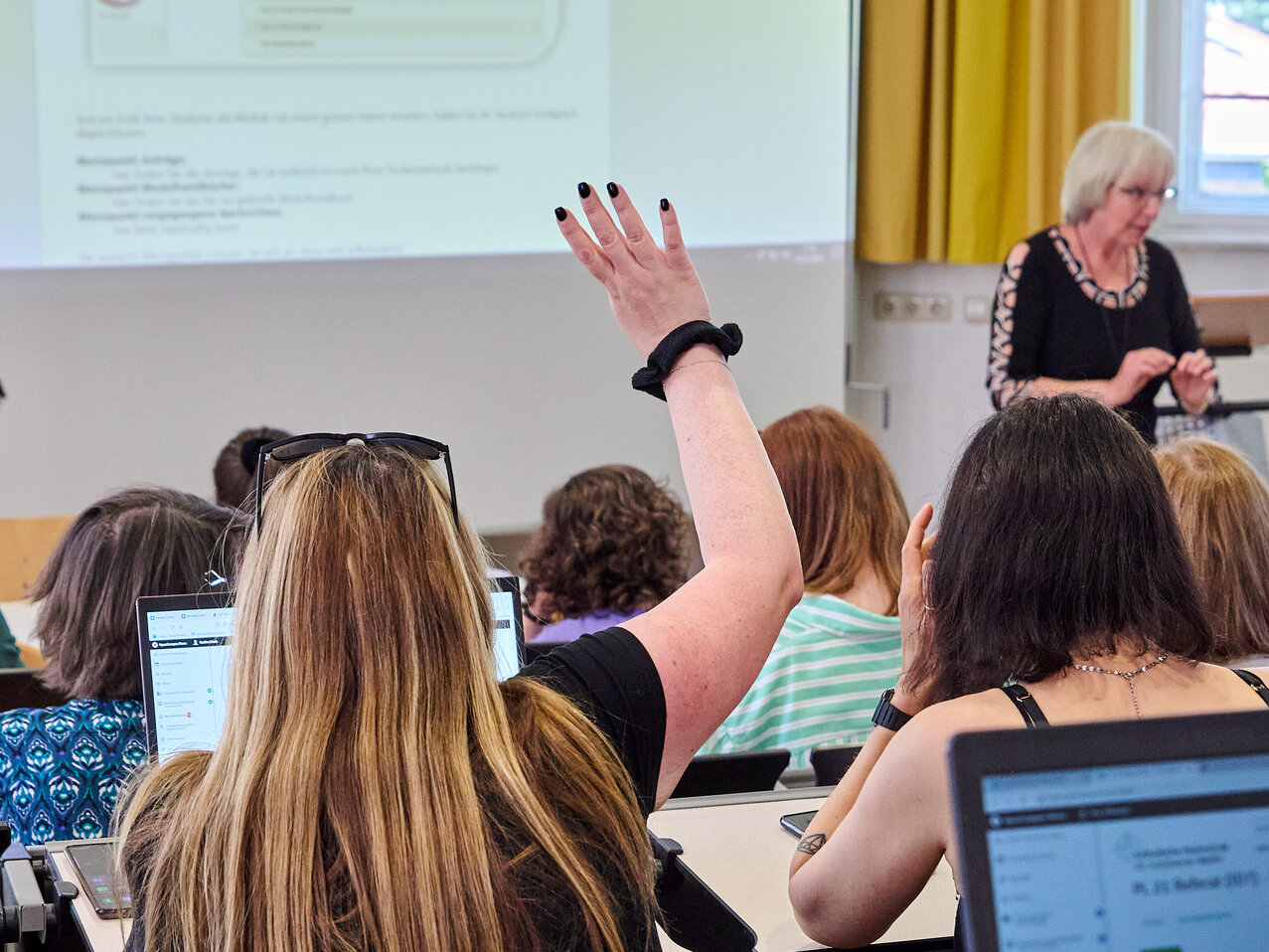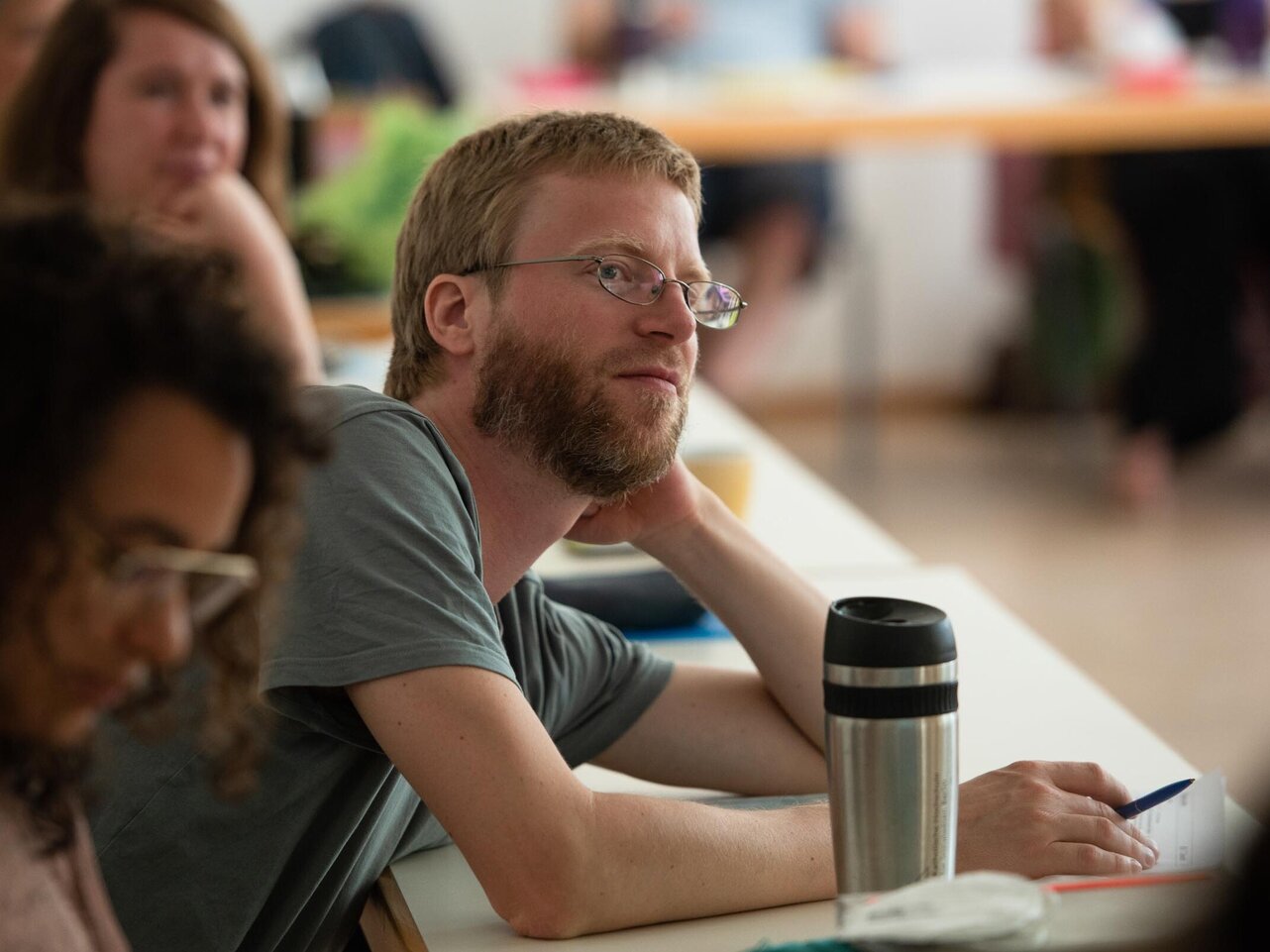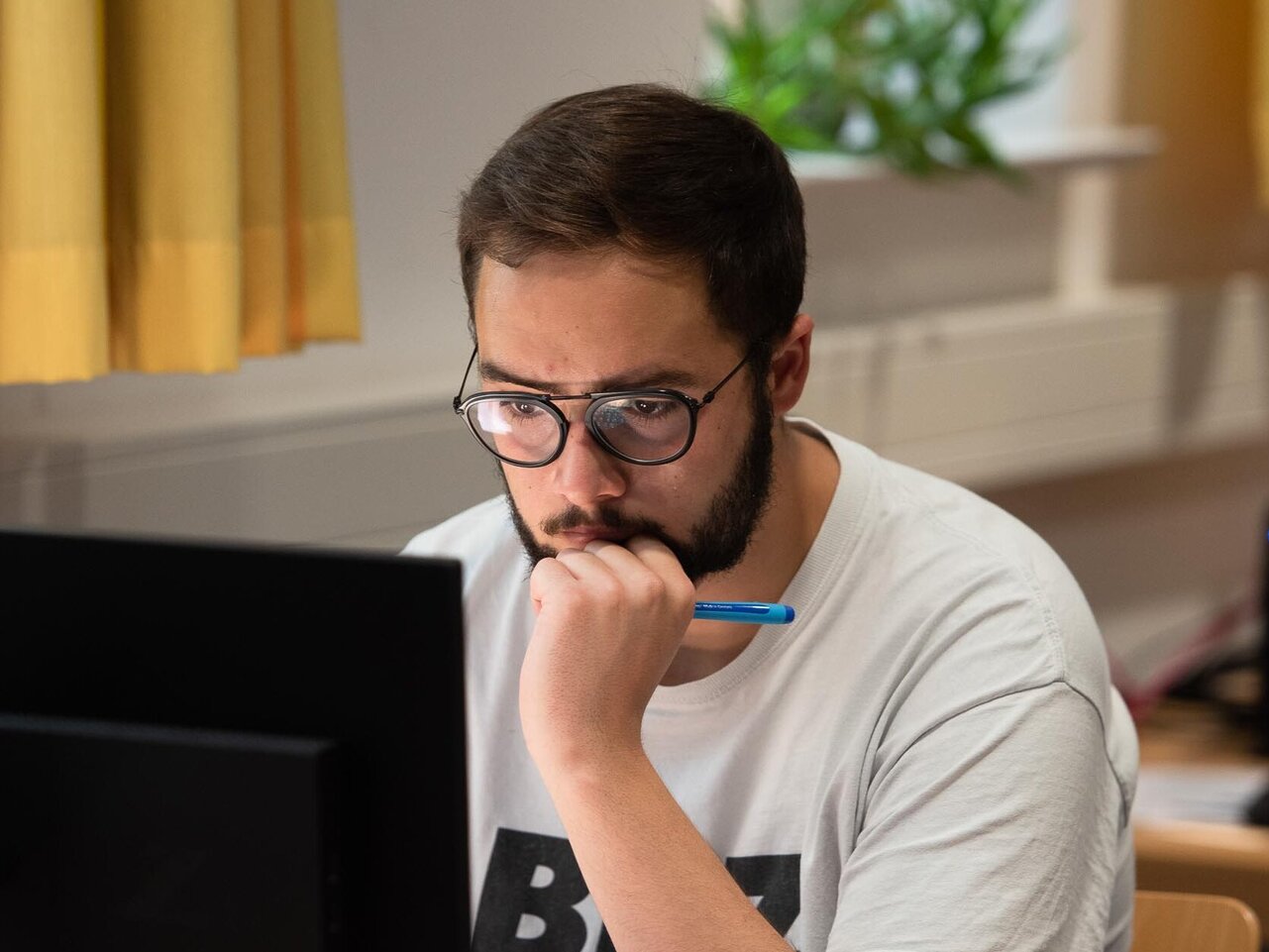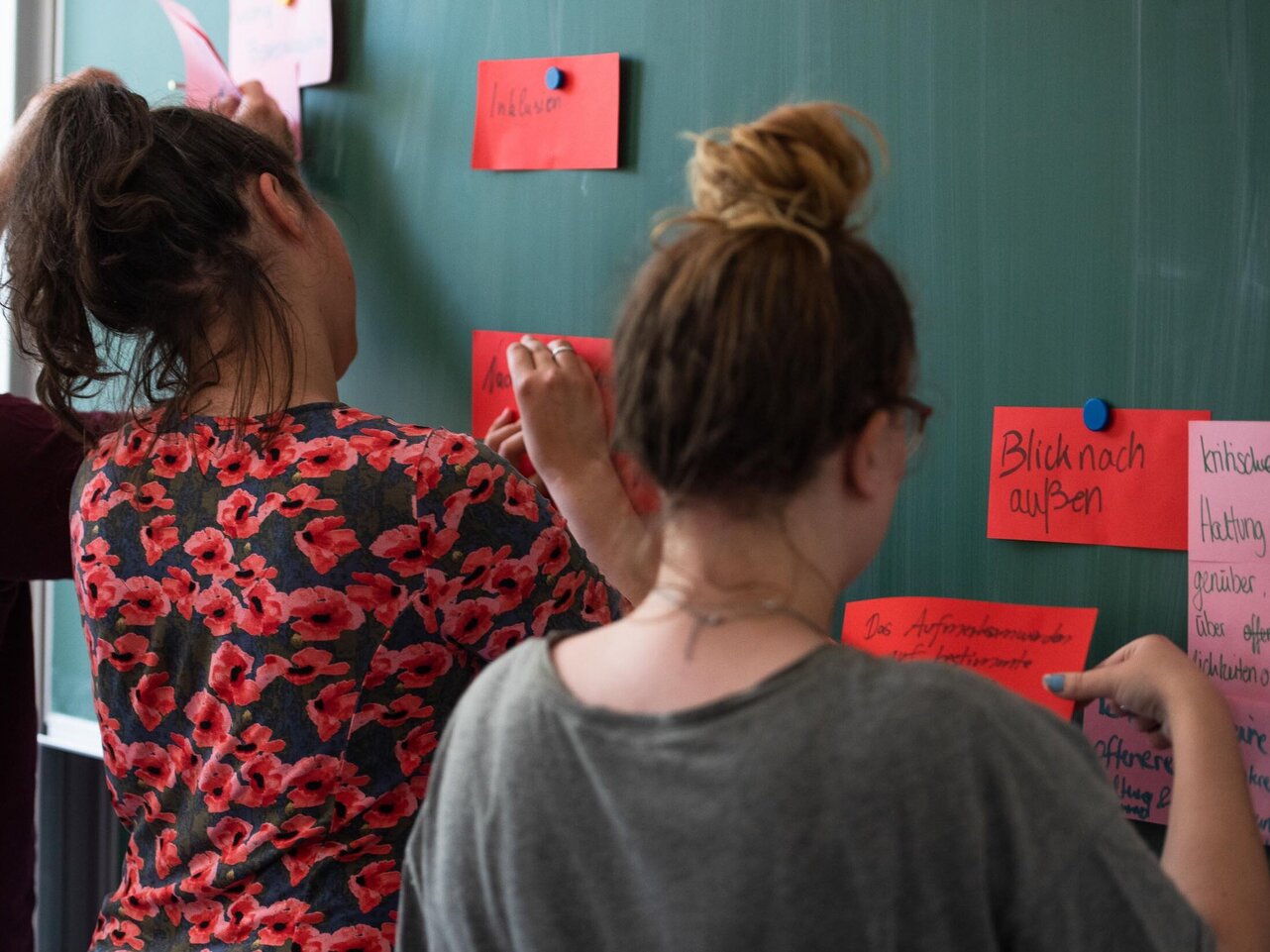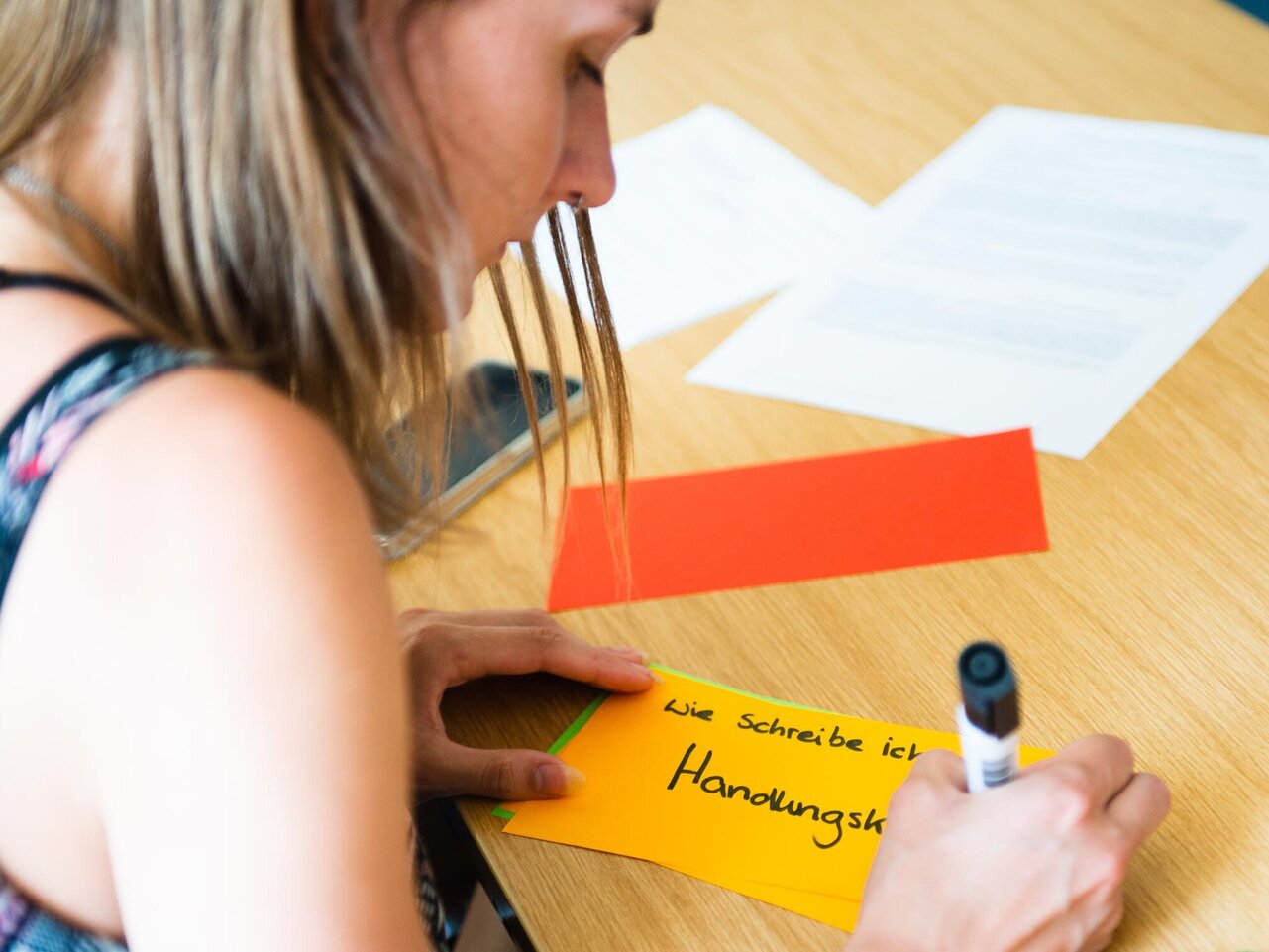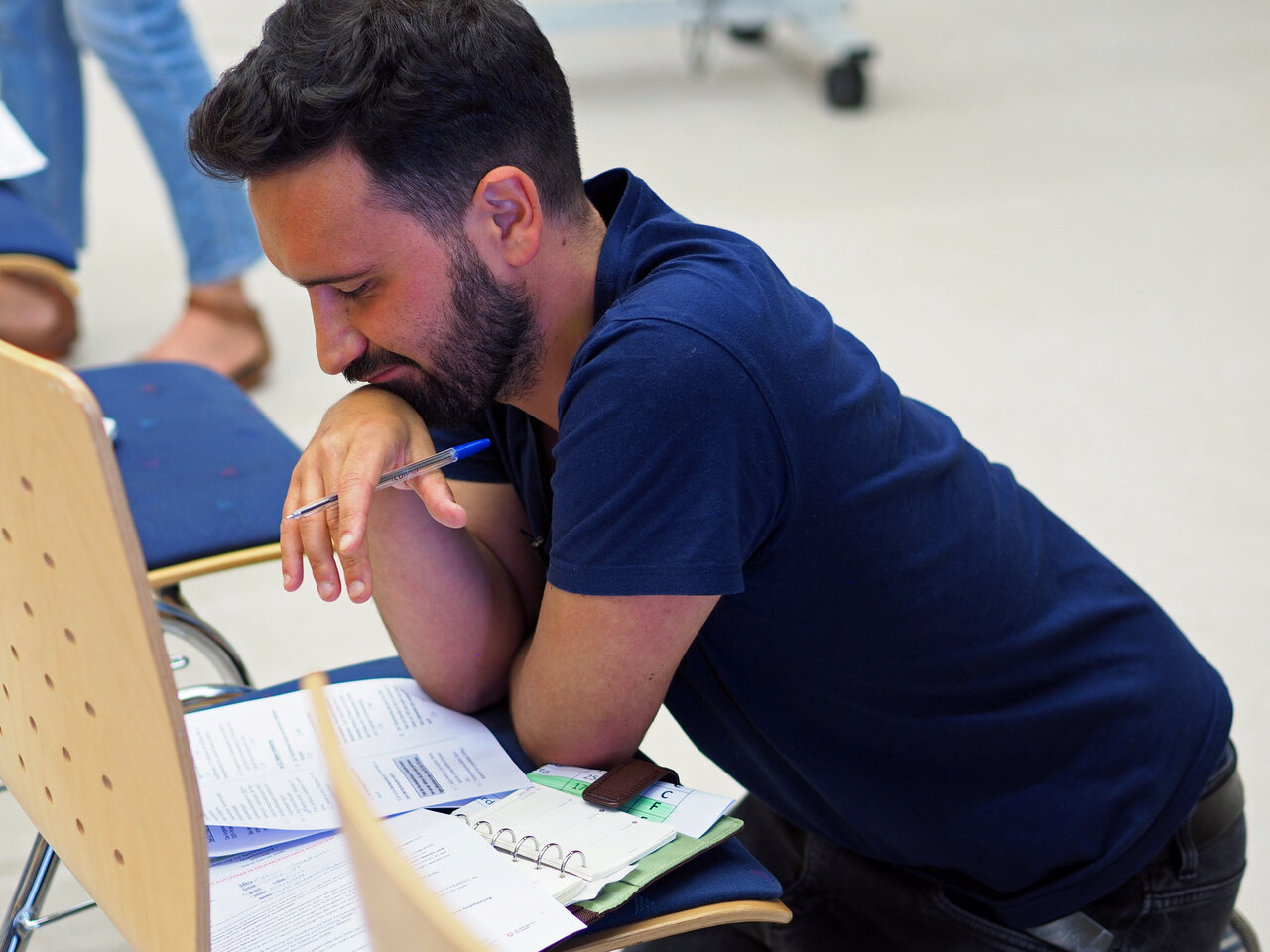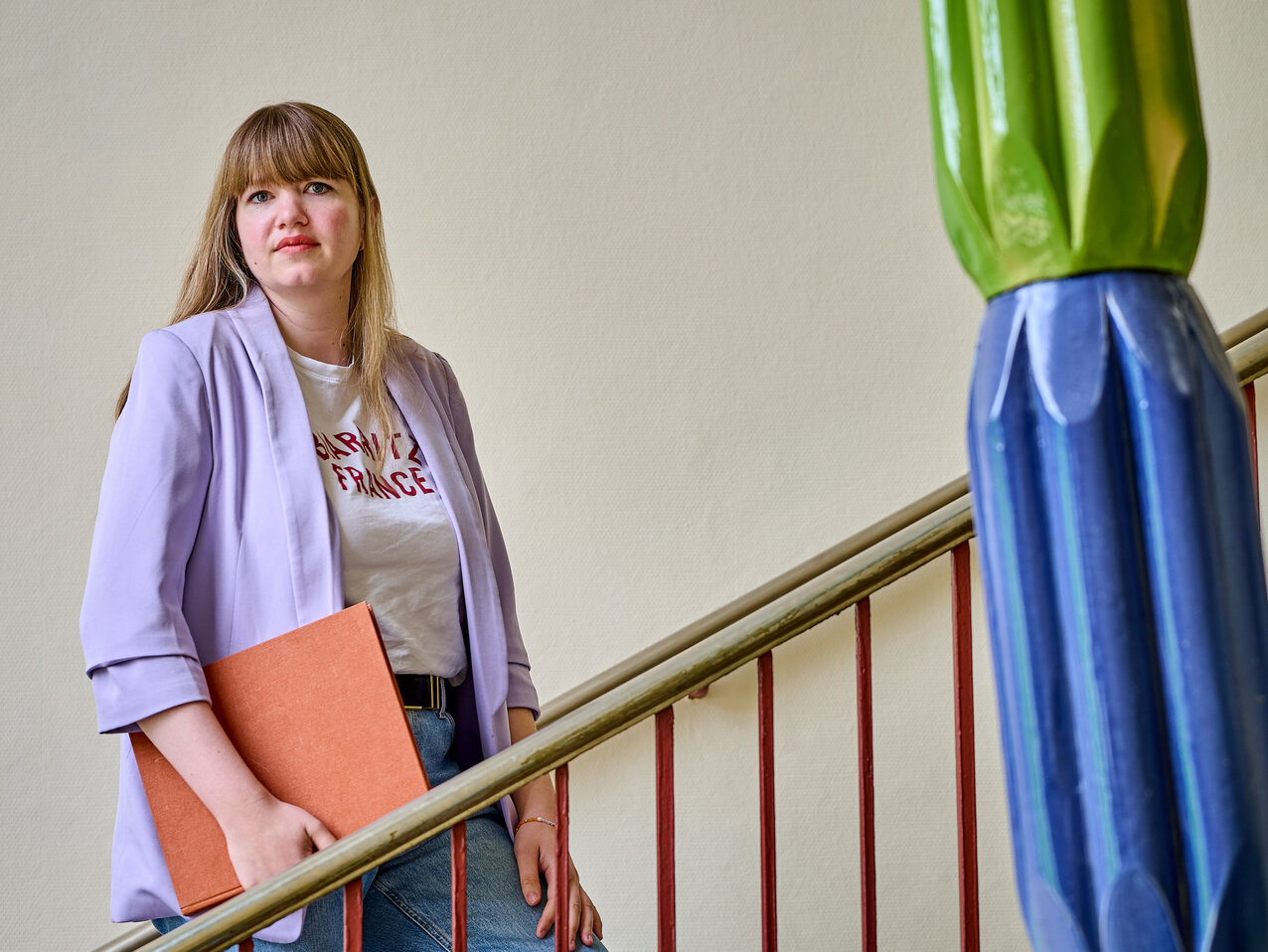Dual Bachelor of Social Work: The special combination of theory and practice
Are you looking for a degree programme that combines the theory and practice of social work in a special way and at the same time offers you financial security and career prospects? Then the dual study programme is just right for you. The academic-scientific and practice-integrated study concept corresponds to the quality model of the Dual Study Programme Berlin.

Dual study programme in social work at the KHSB
The dual study programme in Social Work provides you with the theoretical knowledge and methodological tools you need to work professionally in the various fields of social work. Equipped with the latest scientific knowledge from the field of social work, you will gain valuable practical work experience in an internship during your studies.
The course content at the KHSB and the practical studies at the placement centre are systematically related to each other and coordinated in terms of timing. Through the optimal combination of theory and practice, you will learn to adopt a reflective and enquiring attitude. You will also have the opportunity to develop your personal social-professional profile. This will equip you well for a targeted career start.
Here you can get an overview of selected contents of the Social Work degree programme over the course of the semester. Here you will find the specialisations that are covered during the course of the degree programme. Detailed information on the specific teaching and learning content of each semester can be found in the module handbook, which you can find under "Organisational matters" below.
Dual study programme according to quality standards
In accordance with the Dual Studies Berlin quality mission statement, the programme concept is characterised by a systematic interlinking of the learning locations in terms of content, organisation and contracts. As a member of the Duales Studium Berlin umbrella brand, we are committed to the highest quality standards and close cooperation with all stakeholders involved in the dual study programme.
Your benefits and contractual conditions:
- The employing organisation pays the semester fees and your semester ticket.
- You will receive a tuition fee of approx. 1,400 € (gross) per month.
- The maximum working week is 40 hours per week and you have a contractually guaranteed holiday entitlement.
- Depending on the employer, you will benefit from special payments, capital-forming benefits and/or an additional pension scheme.
Theory-practice interlocking
The dual study programme combines courses at the university with experience at the practical training centres. The systematic integration of the two learning locations in terms of content, organisation and contracts offers you a wide range of learning opportunities. These are ideal conditions for developing your personal and professional skills. Concrete learning objectives for each academic year provide you and the instructors in the practice centres with orientation.
Reflection as a key competence
The Theory-Practice-Reflection I-IV modules provide you with a framework throughout the course of your studies to relate your practical work experience to the content of the university curriculum. The exchange in fixed learning groups and close support from dedicated lecturers promote the desired reflection process. In addition, supervision in fixed small groups (5 to max. 7 participants) from the third to the sixth semester enables you to analyse professional situations and issues in greater depth.
Social work symposium
Specialist days on social work topics are held annually at the KHSB as part of the dual degree programme in Social Work. These offer students and instructors from the practice centres the opportunity to engage with current discourses in social work. The specialist days serve to promote exchange, professional development and cooperation between the university, students and practice centres.
Programme-specific admission requirements
In addition to the general admission requirements, you must fulfil the following admission requirements for the dual Social Work degree programme:
- Proof of a study contract for training as part of the dual study programme in Social Work at the KHSB with a training authority of the state of Berlin or an independent provider listed as a practice partner.
- Successful registration by the employing organisation within the framework of the study place quota agreed with the KHSB.
Expertise
With this degree programme, you will acquire the qualifications for a successful career in the field of social work. Equipped with specialist, practical and personal skills, you can start your career straight after graduation.
After graduating, you will have
- a sound scientific knowledge of the subject of social work,
- sound knowledge of the related sciences of social work (including psychology, ethics, law, education, politics and sociology),
- essential key qualifications for the empathic and goal-oriented organisation of communication and interaction processes with various stakeholders,
- in-depth skills in social-professional methods and concepts,
- a differentiated overview of various professional fields of social work,
- their own professional identity and a sharpened professional profile,
- a pronounced ability to reflect.
Career prospects
By successfully completing the dual study programme in Social Work, you will acquire a first professional qualification (Bachelor's degree). This opens up various fields of social work with interesting and responsible areas of work. As a social work specialist, you will contribute to the realisation of a humane and socially just society.
After successfully completing the degree programme, the state of Berlin or the respective independent provider usually offers the option of direct employment in a permanent position. Depending on the structure of the contract with the practice centre, dual students commit to working for the employing organisation for a maximum of three years after completing their studies.
Fields of work
- Social work with families and adolescents,
- Counselling and support in cases of poverty, unemployment and homelessness,
- Social work in the context of migration, flight and integration,
- Support and re-socialisation of people who have committed offences,
- Social work with people with disabilities and the elderly,
- Execution of sovereign tasks in the public sector.
Further qualification
The Bachelor of Arts degree paves the way for further qualification with a postgraduate Master's programme. With one of our Master's programmes, you can specialise further in your field, qualify for management positions and open up the path to a doctorate.
FAQ Social work dual
No! As a state-recognised university of applied sciences, the Catholic University of Applied Sciences Berlin (KHSB) is not a private university, but a university under church sponsorship. In principle, anyone can study at the KHSB. The denominational affiliation or church membership of students is irrelevant. You are all very welcome.
Yes, you have to look for a work placement yourself, as your application for the dual study programme is made directly to a work placement partner. The
No, unfortunately you cannot look for a practical placement with an organisation that has not yet concluded a cooperation agreement with the KHSB. Every year, the KHSB allocates a quota of study places to public and independent organisations. In order to ensure the quality of the practical placements, the cooperation between the university and the practical placement as well as the requirements for the guidance and study conditions of the dual students are agreed in a cooperation agreement. If the cooperation agreement is in place, the providers can advertise work placements within the agreed study place quota.
During the lecture period, the time spent at the practice centre and teaching at the university alternate on a weekly basis, i.e. you spend one week at the university and then another week at the practice centre. As a rule, there are seven to eight university weeks in a semester. During the lecture-free period, you will spend the entire time at the practice centre. You can claim your holiday entitlement during the practical periods.
During the university and practical week, time is scheduled for self-study in order to complete university-related tasks such as reading texts and preparing for examinations. The programme advisory board recommends at least 2 hours per week for preparation and follow-up work for courses and 1 day for exam preparation. As the time required is individual, instructors and students should agree on the amount of self-study time. University-related tasks should only take up additional time in exceptional cases.
No, the degree programme cannot be shortened if you have the relevant previous qualifications, as the time spent in the practical placements is accredited. It is generally possible to have individual modules credited or recognised. However, as the study contract is designed for full-time employment, you would have to spend the time during which the course in the relevant module takes place at the practice centre.
Conclusion of the study contract
Once you have successfully completed the selection process at the desired employer, you will conclude a study contract with the respective practice centre. This regulates the framework conditions for the dual study programme. The study contract with the state of Berlin is based on a guideline that is orientated towards the legal principles and provisions of the TVA-L BBiG. The study contracts with independent organisations are based on the respective collective agreement provisions.
Contractual framework conditions
- The employing organisation pays the semester fees and your semester ticket.
- You will receive a tuition fee of approx. 1,400 € (gross) per month.
- The maximum weekly working time is 40 hours and you have a contractually guaranteed holiday entitlement.
- Depending on the employer, you will benefit from special payments, capital-forming benefits and/or an additional pension scheme.
Registration at the KHSB
Once you have completed the application process with the hiring organisation, they will send all further information directly to us. You therefore do not need to actively approach us yourself.
We will contact you in writing in mid-January. You will receive a link from us, which you can then use to register with us as a student for the Social Work (dual) degree programme. We will then welcome you for your studies in the summer semester in April!
Contact persons
Are you interested in studying with us and have questions about applying, admission requirements, campus life, enrolment or starting your studies?
Get in touch with us! Paula Schwalm, Childhood Education student, and Ahmed Abdulhay, Social Work student, will be happy to help you as part of their student peer-to-peer counselling service.
Programme management and coordination
The programme director and programme coordinator are your contacts, particularly for technical questions relating to the dual study programme. Write to us or arrange a telephone or personal appointment with the degree programme coordinator Felia Fromm.

